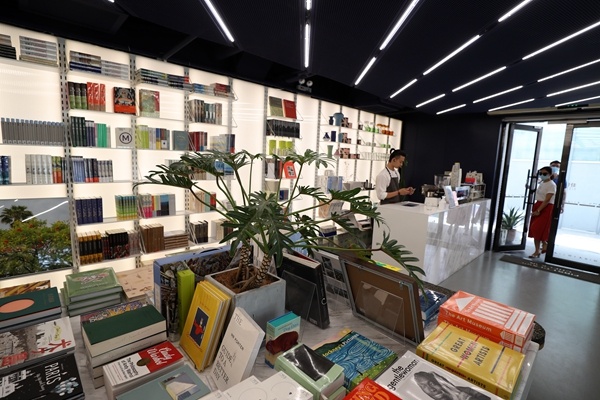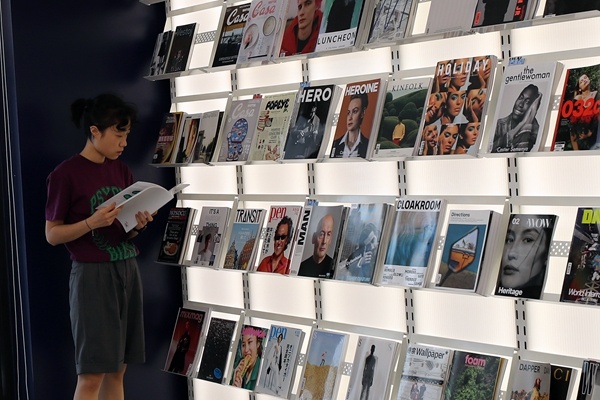
The bookshop located in Sanlitun, Beijing, which opened on March 25 amid the COVID-19 outbreak, provides a small, beautiful world for readers. (Photos: China Daily)
A place in a world of its own that welcomes and enthralls visitors, Yang Yang reports.
Like a symbol of a lost world, it seems almost out of place, even in the small space it occupies. A bookshop? In our modern digital, pandemic, temperature-checking world. A bookshop? In a time of downloads, WeChat. A bookshop? If not lost faith then surely a leap of faith.
The 40-square-meter bookshop, Jetlag Books, sits at a corner of Taikoo Li Sanlitun North, a modern shopping area in Beijing. It is so small that new visitors might miss it at first.
On an April day amid the COVID-19 pandemic, the normally busy streets of Sanlitun were eerily quiet as just a few people walked fast wearing masks and deliverymen whizzed to their destinations on their scooters. Two fashionable young women squeezed through fences and walked upstairs to a door, in front of which were a smooth steel table and chairs.
From the counter just inside the door, the women ordered themselves a cup of coffee each, picked two magazines and started reading. The smell of coffee soon filled the serene space, providing "a key, unique background for a bookstore".
One of the things that 30-year-old Lian Ziqiang, co-founder of the Jetlag Books, learned during the outbreak was that people in isolation realized that offline experiences cannot be replaced by online activities. "So for me, a physical bookshop is a good step to take," says Lian. A brave one as well, he might have added.
Lian, also known online as Wuyun Zhuangbanzhe, opened the bookshop on March 25. It is no secret to say that the sector is facing a challenging time.
"What the internet can't replace is what we need to develop," he says. "I wasn't 100 percent sure about it. I thought even if we couldn't sell products in store, we could continue the business online, but now that's not the case. The on-site experience is a very important thing and the pandemic has proved that."
Lian wants to provide people with the experience of a small and beautiful world in the bookstore, a community where people will feel free to talk to the staff members and each other about their shared interests, such as books, architecture and design.
For people who love design and magazines, the shelves on the left hand are a treat. Lian and his co-founder Cai Wei, an architect, carefully chose publications from all over the world-Popeye, Fantastic Man, and independent magazines from London, Berlin, Amsterdam and Melbourne.
There are more than 80 magazine titles, but due to the pandemic, many foreign magazines have not arrived, not to mention that some had to suspend publishing, Lian says. "Influential ones like Vogue used a photo of a rose as its cover for the combined issue of June and July because people cannot work."

A visitor to Jetlag Books reads a magazine in the store.
Lian has been fascinated with magazines since university and worked as an editor with GQ magazine for five years, so it seems natural for him to underscore magazines in his own bookshop.
"There are two reasons why I sell magazines, mostly foreign magazines. First, we are in Sanlitun, where people accept these kinds of magazines more," he says. "Second, I really love magazines, and we, as a media company, hope that what we love can be enjoyed by more readers."
Lian is now a popular blogger, who also runs a media company and the bookshop.
The design of the bookshop seems unusual, with the deep-blue ceiling and the white, luminous backboard of the bookshelves providing a welllit space.
With the principle to "share world news, beauty and originality", the bookstore sees its target readership as regular global travelers and creative people, Lian says.
Cai explained in a previous interview that she had the idea for an interior design where the bookshelves can be easily rearranged to meet the changing needs of the store.
"The luminous backboards of the bookshelves are also illuminants, which is the starting point for us to choose the materials. Because books are varied, so the backboard should be neutral and quiet to present books as the main characters in the bookshop," Cai said. "Jetlag is a word reminding people of time, travel and insomnia, the folding of day and night, but travelers should be peaceful inside."
Deep blue represents the "night sky and sea, an abstract of traveling, profound, but not depressing, not heavy like black or deep gray", so she chose the deep blue to match the luminous backboard.
Walking inside further, visitors will find books in Chinese and other languages. "The foreign books that we choose will hopefully offer some inspiration for creative people and global travelers, while Chinese books focus on world literature and geography," Lian says.
In the center of the store is a square display platform, which, besides books, will be used to host small shows for independent artists. "We are a small bookshop, so it is impossible for us to host large-scale events like many bookshops do," he says.
As a regular global traveler himself, he loves visiting bookshops around the world. One of his favorites is Soda in Berlin, Germany, which inspired him to open his own bookshop.
Lian fondly recalls the visit because visitors and owners seem to understand each other without speaking a word. "The bookshop creates a community for similar people, which is exactly what I want to do-a small and beautiful bookshop that can develop a kind of culture and community, where cashiers know magazines and books, and can help to recommend books, or just talk with customers about books or design," Lian says.
"In this sense, small bookshops are more friendly, allowing staff members to interact with customers."


